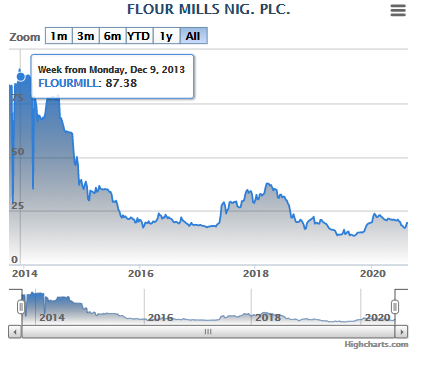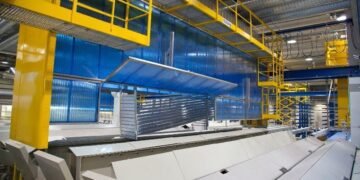Flour Mills of Nigeria Plc has weathered the storm of Covid-19 lockdown, according to its latest condensed consolidated and separate interim financial statements, for Q1 2020/2021 financial year, for the period ended 30 June 2020.
The company recorded a double digit percentage increase in both revenue and profit after tax, although the profit after growth was hampered by the loss (N9.437 billion) recorded due to foreign exchange .
Despite the hurdles of lockdown in the country, Flourmill grew its revenue by 14.7% (N19.833bn) to N154.579 billion in the 3 months April to June 2020 from N134.745 billion recorded in same period in 2019.
Similarly, the company profit after tax rose by 17.3% (N734.088 mn) to N4.971 billion from N4.236 billion in 2019. EPS rose to rose N1.07 from N1.03 in the same period in 2019
A review of the income state statement showed that, food contributed over 58% of the company revenue. Components of the revenue are as follows;
- Food – N91.038 billion
- Agro Allied – N33.099 billion
- Sugar – N27.035 billion
- Support services – N3.407 billion
Flourmill cost control measures improved, as the gross profit margin increased to 16.52% from 12.25% in 2019. The Gross profit rose by 55.1% to N25.549 billion from N16.473 billion in 2019
Cost of goods sold increased by just 9.1% to N129.029 billion from N118.272 billion in 2019. The major component of cost of sales is the material costs which represents 85.46% (N110.278 billion) of the total cost of sales.
Flourmill was able to reduce its selling and distribution expenses slightly to N2.001 billion, from N2.037 billion in 2019. Whereas administrative expenses rose N4.914 billion from N4.636 billion in 2019.
- Read also; Forex Forecast for the week ending 16th to 20th August 2020
- Nigerian Stock Market Review and Stock pick for the week ahead 17th Aug. – 21st Aug. 2020
From the balance sheet it is observed that the company total assets grew by 10.0% to N475.868 billion, within the 3 months in review from N432.453 billion as at 31 March 2020.
Major Changes in the assets column are as follows
- Property, plant and equipment declined to N214.359 billion from N216.890 billion
- Right of use assets dropped to N14.194 billion from N14.933 billion
- Inventories rose to N117.036 billion from N115.596 billion
- Trade and other receivables rose to N30.960 billion from N25.731 billion
- Prepayment & deposit for import increased to N26.371 billion from N18.342 billion
- Cash and cash equivalents rose to N58.828 billion from N26.211 billion
Similar to the total assets, total liability rose by 13.8% to N314.868 billion from N276.646 billion. Major changes in the liability section are;
- Current borrowings rose to N60.751 billion from N23.343 billion
- Trade and other payables rose to N95.136 billion from N83.613 billion
- Non-current borrowings dropped to N73.109 billion from N80.675 billion
- Current tax payable rose to N6.971 billion from N5.531 billion
Total equity grew by 3.2% to N160.778 billion from N155.808 billion. The growth in equity is due to increase in retained earnings to N75.929 billion from N71.523 billion. Only 33.8% of Flourmill total assets is financed by equity.
Flourmill cash flow remained strong with N16.932 billion Net Cash Flow from operating activities. The net cash from investing activities stood at negative (minus N2.618 billion), due to N3.057 spent on acquisition of property, plant and equipment.
The net cash from financing activities was N23.034 billion due to N27.898 billion recorded as term loan.
Cash and cash equivalents at end of the period stood at N58.016 billion mainly due to N20.668 billion cash and cash equivalents at beginning of period/year.
Flourmill was incorporated on 29 September 1960, and is listed on the main board of the Nigerian Stock Exchange under the consumer goods sector. The company is into the business of flour milling, pasta production, importation, blending, distribution and sale of fertilizer, manufacturing and marketing of laminated and woven polypropylene sacks, operation of terminals a and b at apapa ports, etc.
The share was adjusted on Monday for dividend of N1.40 as recommended by the board of directors to N18.30 per share from N19.70 per share. The share price remained unchanged at N18.30 per share at the time of this report because, it has not traded enough quantity to initiate a price change.
The 52 week high and low prices are N24.00 and N13.00 per share respectively.
The seven years share price movement is shown below;

Written by;
Ifunanya Ikueze






















































